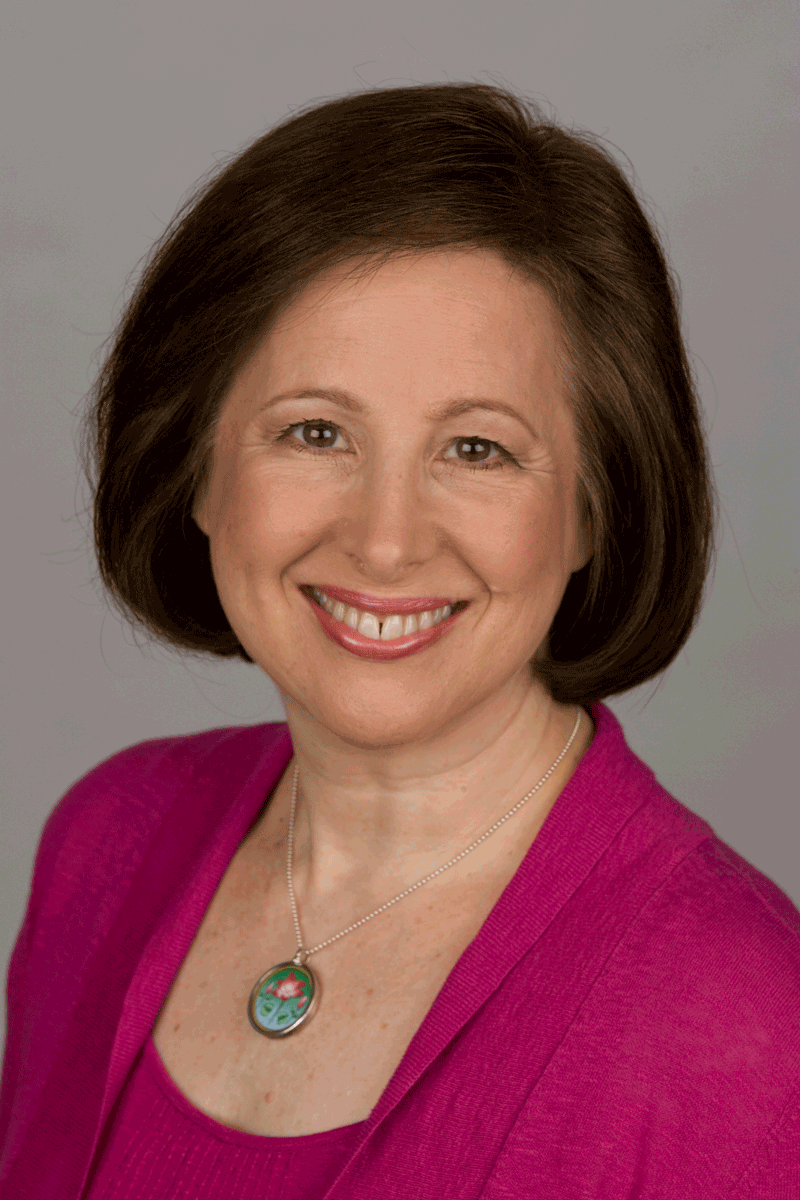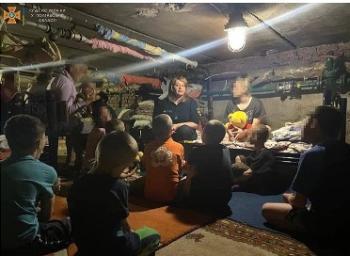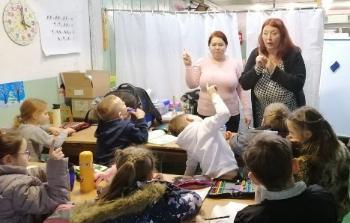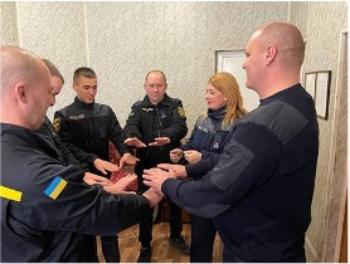Patricia L. Gerbarg, M.D., Assists Ukrainians Through Virtual Mind-Body Trauma Relief Program
Dr. Gerbarg and Richard P. Brown, M.D., continue to teach thousands of people from Ukraine and around the world how to deal with stress and trauma during war and other mass disasters.

Two weeks after Russia launched the full-scale invasion of Ukraine on February 24, 2022, Patricia L. Gerbarg, M.D., clinical assistant professor of psychiatry and behavioral sciences, and her husband, Richard P. Brown, M.D., associate professor in clinical psychiatry at Columbia University College of Physicians and Surgeons and former faculty member at NYMC, and their team offered their first online mind-body trauma relief program in the war-stricken country. Dr. Gerbarg and Dr. Brown are the co-founders of the Breath-Body-Mind Foundation. Psychologists, veterans, schoolteachers, emergency services professionals and refugees registered for their course to help themselves and the Ukrainian community survive the stress and trauma that come from war and losing loved ones. The courses have drawn anywhere from a few dozen to 700 students. Since they began a year ago, thousands have learned from their trauma relief teachings and 250 Ukrainians, mostly mental health professionals, became certified Breath-Body-Mind trauma relief teachers.
The stressful conditions Ukrainians are under, whether they’re on the front lines or refugees, can cause a high incidence of post-traumatic stress disorder (PTSD) in adults and children. PTSD can result in anxiety, panic attacks, nightmares and even take the shape of physical and mental exhaustion, headaches and stomach ailments. The breath-centered mind-body-relief program uses simple and easy to teach techniques to provide rapid relief during moments of distress for children and adults. Graduates of the courses have used practices, such as deep breathing, slow movements and imagery exercises to help children who are taught in schools and in bomb shelters.
 “Triggers for stress and trauma are happening everywhere all the time,” said Dr. Gerbarg. “Adults are very concerned about the effects this will have on the children in Ukraine, who must live with these traumas, the losses of family members, being displaced, being in refugee camps and more.” (Picture left: Dr. Tatyana Vatulova teaches children in a bomb shelter.)
“Triggers for stress and trauma are happening everywhere all the time,” said Dr. Gerbarg. “Adults are very concerned about the effects this will have on the children in Ukraine, who must live with these traumas, the losses of family members, being displaced, being in refugee camps and more.” (Picture left: Dr. Tatyana Vatulova teaches children in a bomb shelter.)
Dr. Gerbarg and Dr. Brown began their mind-body trauma-relief programs 20 years ago in the United States after the terrorist attacks on September 11, 2001. Since then, they have expanded the program to other countries around the world. When they first learned about the COVID-19 epidemic in January 2020, they anticipated that in-person courses would no longer be safe. They began strategizing a way to provide the program to an online format, while also teaching effectively. They rolled out the first online program six months later.
Various trauma-related online courses with Ukrainian translation are offered, which range from three to 40 hours and take place on a weekly or monthly basis. Dr. Brown, also teaches advanced techniques for people who may need specialized instruction, for example, for working with military personnel or those with serious physical injuries. Dr. Gerbarg offers seminars on integrating their mind-body practices into psychotherapy.
In the teacher trainings, the attendees are taught how to teach the practices in-person or online and how to adapt the practices for people who may have physical conditions, respiratory problems or emotional disorders. They’re also taught how to adapt the teaching methods for different cultures and steps to take if someone should have a negative reaction.
 Trauma techniques were tailored for Ukrainians and practices had to be softened and slowed down because many people were physically sensitive due to the bombings, and they could be triggered by loud sounds or vibrations. Also, imagery exercises for children were changed, for example, from a clear blue sky, which could be associated with bombs falling, to a quiet secret garden of their own. (Picture right: Dr. Juliya Venger calms children with Magic Finger Breath technique.)
Trauma techniques were tailored for Ukrainians and practices had to be softened and slowed down because many people were physically sensitive due to the bombings, and they could be triggered by loud sounds or vibrations. Also, imagery exercises for children were changed, for example, from a clear blue sky, which could be associated with bombs falling, to a quiet secret garden of their own. (Picture right: Dr. Juliya Venger calms children with Magic Finger Breath technique.)
During one four-hour training, a Ukrainian veteran who suffered from war-related PTSD shed tears of relief and told Dr. Gerbarg that he was finally able to calm down. He realized that he was beginning to heal from the war trauma he had.
Dr. Gerbarg remarked, “Some of the people I’ve trained said this is the first time in months that they stopped shaking or this is the first time they’ve been able to hear a siren go off and not have a panic attack.”
 The first two-hour Breath-Body-Mind Foundation crisis session online was open to all Ukrainians and provided translators. More than 100 people were in attendance, including psychologists from the Positive Psychotherapy Association of Ukraine, who spread the teachings to their colleagues. The association later co-sponsored programs with the Breath-Body-Mind Foundation and introduced Dr. Gerbarg to prominent psychologists and psychiatrists in their country. (Picture left: Dr. Tatyana Vatulova de-stresses emergency rescue workers after a bombing.)
The first two-hour Breath-Body-Mind Foundation crisis session online was open to all Ukrainians and provided translators. More than 100 people were in attendance, including psychologists from the Positive Psychotherapy Association of Ukraine, who spread the teachings to their colleagues. The association later co-sponsored programs with the Breath-Body-Mind Foundation and introduced Dr. Gerbarg to prominent psychologists and psychiatrists in their country. (Picture left: Dr. Tatyana Vatulova de-stresses emergency rescue workers after a bombing.)
Ukrainian psychologists and psychiatrists told Dr. Gerbarg that while they were busy taking care of as many people as they could, they were also spending nights and weekends studying trauma courses. Many of them were struggling with their own depression and exhaustion, while trying to take care of their patients. Professionals found the Breath-Body-Mind Foundation courses helpful in many ways.
“They told us that our teachings were different because we treated them with respect and acknowledged that they know a lot too,” Dr. Gerbarg said. “Also, we taught them how to take care of themselves. You have to be in the right psycho-physiological state in order to be able to convey these practices effectively and help other people.”
Plans are underway to offer more specialized courses to support people in the military, children, and victims of sexual assault. The goal is to train as many Ukrainian mind-body trauma teachers as possible to expand and support programs providing emotional and physical relief to those who need it most.
